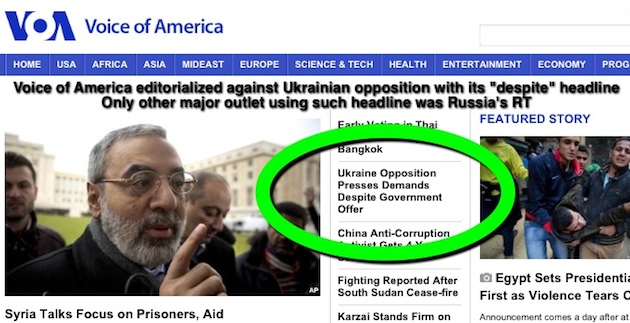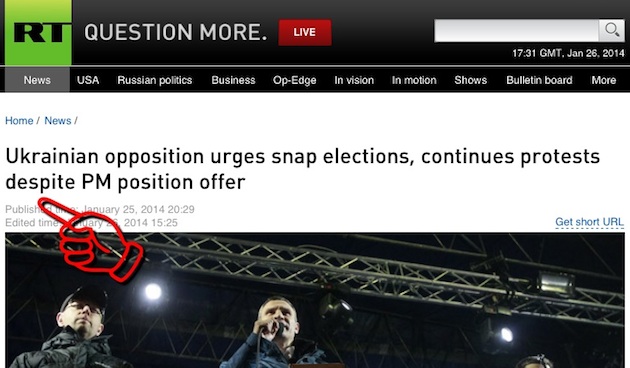BBG Watch Commentary

Both U.S. taxpayer-funded Voice of America (VOA) Worldwide English News and Russia’s RT English news website used almost exactly the same editorializing news headline in describing the rejection by Ukrainian opposition leaders of President Yanukovych’s offer of government positions.
The VOA headline read: “Ukraine Opposition Presses Demands Despite Government Offer,” VOA Worldwide English News, Jan. 26, 2014.
The RT (Russia Today) headline, which appeared earlier, read: “Ukrainian opposition urges snap elections, continues protests despite PM position offer,” RT English News, Jan. 25, 2014.
According to dictionary definitions, preposition “despite” means “without being affected by; in spite of.” It can also mean “contempt; disdain.”
“Despite” can be used in a headline in a journalistically neutral context as in “Rescue operation continued despite bad weather.”
But in such a highly politically charged situation as in Ukraine, its use amounts to editorializing, if not outright bias. VOA is implying with its headline that President Yanukovych’s offer was somewhat genuine and acceptable, not designed to trick or trap the opposition.
Russia’s RT’s intention all along in covering this crisis was to present the Ukrainian opposition as both violent and extremist. For whatever reason, VOA used almost exactly the same headline as RT.
It is hardly surprising that RT would choose such a biased headline, but its use by Voice of America may simply be yet another indication of the total breakdown of VOA news reporting, editorial controls in the newsroom and mismanagement at the very senior level.
As an example, the VOA English website failed to report on Secretary Kerry’s remarks in Davos that U.S. diplomats were also engaged in talks with President Yanukovych in an attempt to being an end to violence and on Kerry’s comment that the U.S. “will stand with the people of Ukraine.” Even RT reported some of Kerry’s comments. Instead of reporting on Kerry’s remarks on Ukraine and those of several key U.S. Senators, VOA English website had three news reports on Justin Bieber’s legal problems.
 In reporting on the Ukrainian opposition’s rejection of President Yanukovych’s offer, none of the other major international broadcasters: Al Jazeera, BBC, or Deutsche Welle used “despite” in their headlines or in the text of their news stories to describe how anti-government Ukrainian leaders responded to the offer. Their reports focused on the complexity of the situation and presented a sophisticated analysis as to what might have driven President Yanukovych to make his offer in the form he made and what drove the opposition to rejected in the form it was presented.
In reporting on the Ukrainian opposition’s rejection of President Yanukovych’s offer, none of the other major international broadcasters: Al Jazeera, BBC, or Deutsche Welle used “despite” in their headlines or in the text of their news stories to describe how anti-government Ukrainian leaders responded to the offer. Their reports focused on the complexity of the situation and presented a sophisticated analysis as to what might have driven President Yanukovych to make his offer in the form he made and what drove the opposition to rejected in the form it was presented.
“Ukraine opposition rejects government deal,” Al Jazeera, Jan. 26, 2014.
“Ukraine: President Yanukovych blinks first over protests,” BBC, Jan. 26, 2014.
“Ukraine protests spread after opposition shun Yanukovych offer,” Deutsche Welle, Jan. 26, 2014.
The New York Times also had a journalistically neutral headline: “Opposition Says No to Ukraine on Power Share,” David M. Herszerhorn, The New York Times, Jan. 26, 2014.
VOA’s Ukrainian Service also avoided the semantic trap VOA English News may have picked up from Russia’s RT. VOA Ukrainian Service’s headline read: “Опозиція не вірить обіцянкам Януковича; заявляє, що готова до відповідальності” (“The opposition does not believe promises of Yanukovych, says it is ready to accept responsibility”), VOA Ukrainian Service, Jan. 26, 2014.
VOA Ukrainian headline was correct. Ukrainian opposition leaders said that they were not afraid of accepting the responsibility of entering the government, but they would not do it on Yanukovych’s terms as presented to them during negotiations.
VOA Russian Service also did not use VOA English News report and headline. VOA Russian used journalistically neutral headlines and descriptions “Украинские демонстранты укрепляют баррикады после провала переговоров” (“Ukrainian protesters reinforce the barricades after the collapse of talks”) and “Переговоры между правительством и оппозицией не принесли результатов” (“Negotiations between the government and the opposition have not yielded results”), VOA Russian, Jan. 26, 2014.
Some other VOA language services, however, used VOA English News report with its editorializing headline. In past years, VOA language services would have alerted the central newsroom if they saw such an obviously biased headline, but that kind of collaborative effort has disappeared in the dysfunctionality and hostile work environment created by current VOA executives who have also deprived the newsroom and language services of resources needed to produce timely and journalistically solid news.
Ironically, VOA English central newsroom did have a journalistically solid news report filed from Kyiv by VOA correspondent James Brooke. (Until now, VOA English News did not have its own correspondent in Kyiv. Brooke who is based in Moscow must have just arrived there.) The headline of his report was journalistically correct and neutral: “Ukraine Opposition Cool to Power-sharing Offer,” James Brooke, VOA, Jan. 26, 2014.
Brooke reported quoting Reuters news agency that one of the president’s main foes described the offer as a “poisoned” attempt to kill off a protest movement in a country plunged into unrest by Yanukovich’s U-turn from the European Union towards Russia. The opposition has demanded that both Yanukovych and Ukraine’s number two leader, Prime Minister Mykola Azarov, step down. Protesters have also called for early elections, VOA’s Brooke reported from Kyiv.
However, Brooke’s report cannot be seen on the VOA English homepage, which features instead a VOA English News report with a questionable headline.
Cleary University, a business school in Michigan, has these warnings for journalists who are either biased or do not have much insight into what they are reporting:
How to Detect Bias in the News – News Not Just Black & White
Bias by headline
Many people read only the headlines of a news item. Most people scan nearly all the headlines in a newspaper. Headlines are the most‐read part of a paper. They can summarize as well as present carefully hidden bias and prejudices. They can convey excitement where little exists. They can express approval or condemnation.
Word choice and tone
Showing the same kind of bias that appears in headlines, the use of positive or negative words or words with a particular connotation can strongly influence the reader or viewer.
